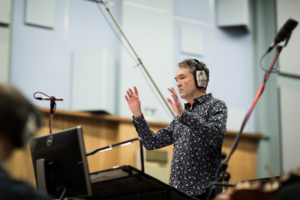 When her daughter’s murder remains unsolved, Mildred, a grieving mother (Frances McDormand), posts a contentious message directed at the town’s esteemed chief of police (Woody Harrelson), on three roadside billboards leading into her small town.
When her daughter’s murder remains unsolved, Mildred, a grieving mother (Frances McDormand), posts a contentious message directed at the town’s esteemed chief of police (Woody Harrelson), on three roadside billboards leading into her small town.
Director, Martin McDonagh stages the darkly comedic drama in a rural Americana world, where everybody knows everyone else; a world that informs the characters, their actions and the resulting conflicts. Composer, Carter Burwell captures that particular world with his country music inspired score, and although he was not involved in the choice of source music used in the film, Burwell agreed that the flow of the songs with the score helped set the musical tone for the story.
“I very much wanted to capture the feeling of that place, so the source material is important.” Burwell explained, “Even though it might not be coming out of a record player or radio, when it does, it tells you something about that character. That character chose that record. That character chose that radio station. Those songs are important for capturing those characters at the locale.”
Burwell wanted his music to work with the songs. He did not want to use strings and an orchestral sound. His instrumentation stayed in keeping with the country music genre through the use of guitars, banjos, mandolins, bells and some percussion. The composer noted that the film “is full of big, hot emotions that run the gamut,” which did not need the amplification of a big Hollywood-style score.
Having worked with the director previously, Burwell was sent a script well in advance of production. McDonagh wanted the music to play the heart of the film, which was the loss of Mildred’s daughter. Although that event happened before the film began, it drives all the action in the movie.
“I really tried to play the locale. To play the determination of Frances McDormand’s character, and play the loss that she’s experienced, which motivates everything that happens in the film, but keep it in the vernacular of that place,” shared Burwell.
The farther the story progresses, the more intense the emotions become, as more violence is introduced into the action. Burwell did not want to play the darkness or push the characters into a bad space.
Establishing themes in the music early on, such as when Mildred is just a normal housewife driving down a country road, and then recalling those themes during more outrageous scenes later in the film, helped to moderate the enhanced emotions, reminding the listener that “this is a Mom who lost her daughter.” Having a theme that plays against the scene in that way was an important role for the music in the film.
Composing music for Three Billboards was a challenge because the characters and their actions had such a wide range of emotions and behavior. That made it difficult to find any one touchstone for the music to rest on. Every character is both sympathetic and despicable.
Mildred has two themes: when she is a Mom in family mode trying to cope with her loss, and when she puts her hair up and goes to war. These two themes convey the problem that motivates her and the action she is taking to solve that problem.
“I like to have a concept for the score, something I can say to myself when I’m working. This is what I’m trying to do in this film. This is the goal,” revealed Burwell. “It was hard to come up with a concept, because the characters are so rich and so self-contradictory, they defy any simplification.”
With his subtle, carefully crafted score for Three Billboards, Burwell succeeds in reaching his goal.





